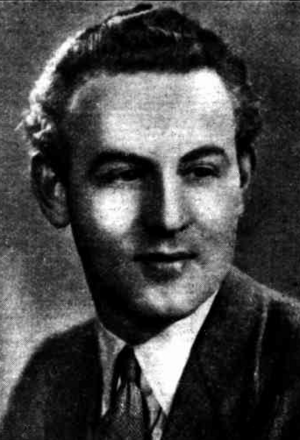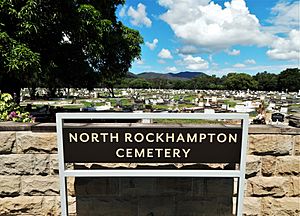Danny Malone facts for kids
Quick facts for kids
Danny Malone
|
|
|---|---|

Danny Malone
|
|
| Born |
John York Millar Johnston
15 July 1909 Ballyclare, County Antrim, Ireland
|
| Died | 21 August 1951 (aged 42) On passenger train between Marmor and Raglan, Queensland, Australia
|
| Burial place | North Rockhampton Cemetery, Norman Gardens, Queensland, Australia |
| Nationality | Irish Australian |
| Occupation | performer |
| Years active | 1933–1951 |
| Known for | Performing on radio, releasing gramophone records, appearing in musical films, singing in vaudeville shows |
|
Notable work
|
Rose of Tralee, Stepping Toes, Bonnie Prince Charlie |
| Spouse(s) |
|
| Children | 1 |
John York Millar Johnston (born July 15, 1909 – died August 21, 1951) was an Irish singer known as Danny Malone. He was a tenor, which means he had a high male singing voice.
Danny Malone became very famous in the 1930s. He had a successful audition with the BBC (British Broadcasting Corporation). He sold thousands of records and toured many countries. He performed in the United Kingdom, the United States, and Australia. Malone also appeared in movies like Rose of Tralee and Bonnie Prince Charlie.
Early Life and Travels
Danny Malone was born John York Millar Johnston on July 15, 1909. His family lived in Ballyclare, near Belfast, in County Antrim, Ireland. He was one of eight children. His family was very poor, so he had to work from a young age. He sold newspapers for three years to help his family.
Later, he worked in shipyards in Belfast. The working conditions were bad, so he left that job. He then traveled around Ireland looking for work. Malone eventually got a job as a deck boy on a ship. This ship sailed all the way to Australia, and he earned very little money.
He got off the ship in Sydney, Australia. He then traveled across the eastern parts of Australia, often walking long distances. When he ran out of money, he would sing in small towns. This was called busking, and it helped him earn enough money to survive each day.
While traveling, Malone slept outdoors. He learned how to ride trains without paying and how to find water. He worked many different jobs. These included being a boundary rider (someone who checks fences on large farms), a roustabout (a worker on a sheep station), a rabbiter, and a cane cutter.
After some time, he missed his home. He found work on a Swedish ship that was going back to Europe. This allowed him to return to Ireland.
His Big Break
In November 1932, Malone went to London, hoping his luck would change. But he still struggled to find work or a place to live. He was very hungry and slept outside. He sang near London pubs to try and earn some money.
Feeling desperate, Malone visited the office of Basil Charles-Dean. Charles-Dean was an Australian songwriter and music publisher. Malone asked him for a job. When asked what he could do, Malone listed all his past jobs. Charles-Dean then asked if he could sing. Malone humbly said he could sing "a little."
As Charles-Dean played Irish songs on the piano, Malone sang along. Charles-Dean was amazed by Malone's voice. He quickly called Martin Webster from the BBC. An audition was set up right away.
Malone was so hungry that he fainted after the audition. But his performance was a huge success! He was booked to appear on a BBC show the very next day. Famous stars like Gertrude Lawrence and Douglas Fairbanks Jr. were also on the program.
Malone's first performance was a hit. His fame grew quickly, and people called him the "Fame in a Night Tenor." His voice was even compared to another famous Irish singer, John McCormack. Malone performed about 500 times for the BBC Empire Service. This included a special show for St Patrick's Day.
He recorded many songs for big record labels like HMV, Decca, and Columbia. Some of his popular songs included "Danny Boy", "When Irish Eyes Are Smiling", and "Mother Machree". Basil Charles-Dean even wrote a song just for him called "Though There's Millions Around (I'm Alone)."
Malone went on many tours. He performed in England, Ireland, Scotland, New Zealand, Australia, and the United States. In 1937, he sang on the NBC Radio Network for over four months before his American tour.
After a successful time at the London Palladium, Malone returned to Australia in 1939. He performed at the Prince Edward Theatre in Sydney.
His career seemed to slow down in the 1940s. In 1942, he was made to work in underground coal mines in Doncaster for two years. This was part of the war effort during World War II.
Malone later found help from The Salvation Army. He said he joined them after seeing their brass band. He felt it was the best thing he had ever done. He said, "With the help of my Army friends, I won out. I have a good job."
In the late 1940s, Malone performed at the Theatre Royal in Brisbane, Australia. He was in many stage shows there. His work led him to perform in smaller cities in Queensland, Australia. People in these towns loved his powerful voice. After a show in Rockhampton in 1951, a local newspaper praised his singing. It said his Irish songs and beautiful delivery were amazing.
In July 1951, Malone started a tour of regional Queensland. He was the main act in places like Townsville and Mackay. His last performance was in Mackay on August 15, 1951.
His Passing
On August 21, 1951, Malone was traveling on a train to Gladstone. He was scheduled to perform there. He suddenly collapsed and died on the train. This happened between the towns of Marmor and Raglan.
His body was taken to Rockhampton for an examination. Doctors found that he died from heart problems.
The Salvation Army held his funeral service on August 23, 1951. He was buried at the North Rockhampton Cemetery.
A special show was held at the Tivoli Theatre in Rockhampton a few days later. It was to honor Malone and to show that "the show must go on."
Personal Life
In 1934, Danny Malone married Hazel Emily Knight in London.
Later, in 1938, Malone married Blanche Huxley. She was known as Jean and was from Charters Towers, Australia. They married in Southend-on-Sea.
When he passed away, Malone had been living in Queensland, Australia, for about three years.
Images for kids





